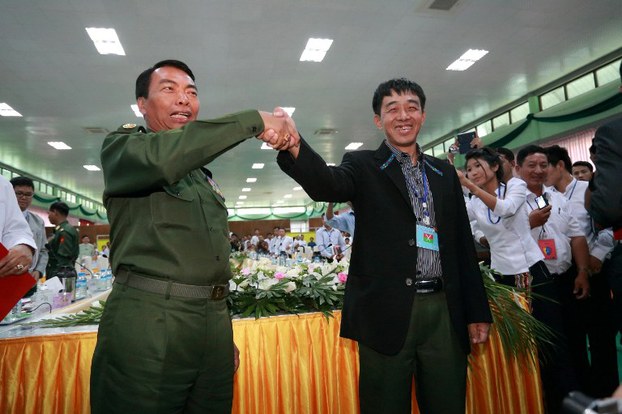Myanmar government hopes for nationwide cease-fire in October
| Publisher | Radio Free Asia |
| Publication Date | 11 September 2013 |
| Cite as | Radio Free Asia, Myanmar government hopes for nationwide cease-fire in October, 11 September 2013, available at: https://www.refworld.org/docid/5257c2fe12.html [accessed 1 June 2023] |
| Disclaimer | This is not a UNHCR publication. UNHCR is not responsible for, nor does it necessarily endorse, its content. Any views expressed are solely those of the author or publisher and do not necessarily reflect those of UNHCR, the United Nations or its Member States. |
2013-09-11
 Lt. Gen. Myint Soe (L) and KIA Deputy Chief of Staff Guam Maw (R) shake hands after signing an agreement to cease hostilities in Kachin state, May 30, 2013. AFP
Lt. Gen. Myint Soe (L) and KIA Deputy Chief of Staff Guam Maw (R) shake hands after signing an agreement to cease hostilities in Kachin state, May 30, 2013. AFP
Myanmar's government is optimistic of forging a joint nationwide cease-fire accord with all armed rebel groups in the country by next month, a government adviser said Wednesday, keeping fingers crossed that crucial talks next week with Kachin rebels will lead to a breakthrough.
Hla Maung Shwe, adviser of the Myanmar Peace Center, said the long-proposed nationwide cease-fire could take place in the first week of October.
An announcement of an October launch of the peace initiative by Minister in the President's office Aung Min at the weekend met with skepticism by ethnic leaders.
But Hla Maung Shwe said that a nationwide cease-fire next month remains a possibility pending discussion between the Kachin Independence Organization (KIO) and the government.
The KIO, a member of the key United Nationalities Federal Council (UNFC) rebel alliance, is the only major armed ethnic group that has not yet signed a cease-fire pact with the government.
The government has said since earlier this year that it wants to have the comprehensive truce after it reaches accords with each of the country's 16 ethnic rebel groups individually.
"We are discussing what we need to go toward as a technical team between the government's peace committee and ethnic armed groups," Hla Maung Shwe told RFA's Myanmar Service, speaking after talks with Karen and Shan rebels in Yangon on Wednesday.
"After this discussion, the ethnic armed groups will prepare what they need and the government's peace committee is going to prepare what it needs," he said.
"If everything is all right on both sides, the union-level discussion will be held in Myitkyina in the first week of October as Minister Aung Min suggests."
Government representatives are set to meet with the KIO next week in Myitkyina, the capital of northern Kachin state.
The KIO and the government signed a preliminary agreement in May to reduce violence between their respective forces, but the pact falls short of a full cease-fire.
Kachin breakthrough key
The UNFC, an umbrella organization of 11 of Myanmar's armed rebel groups, has indicated that the peace process cannot move forward until the Kachin reach an accord with the government.
After a weekend meeting with UNFC leaders where Aung Min announced the October plans for the nationwide cease-fire, the alliance's secretary general Nai Hong Sa said the timing was unlikely because ethnic rebel leaders disagreed with a number of demands the minister had listed at the meeting, the Irrawaddy journal reported.
Nai Hong Sa said the rebel leaders were not pleased with requirements that the groups must not collect taxes, recruit new members, intervene in the government's administration, or initiate hostilities with government-backed militias, according to the journal.
The Myanmar government had announced in June that it would organize a nationwide cease-fire accord in July, but the conference never took place.
The KIO, which has an estimated 10,000 fighters, signed a cease-fire agreement with Myanmar's military regime in 1994, but the agreement broke down in June 2011 when fighting erupted between the government army and KIA soldiers.
More than 100,000 people have been displaced in the deadly violence, which has overshadowed the reforms Myanmar has undertaken as it emerges from decades of military misrule.
In December, the military's use of air strikes against the Kachin Independence Army (KIA) caused an international outcry.
Reported by Myint Oo and Kyaw Thu for RFA's Myanmar Service. Translated by Khet Mar. Written in English by Rachel Vandenbrink.
Link to original story on RFA website
